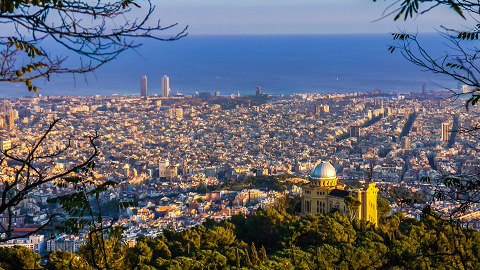More urban green needed in Barcelona to have positive effects on environmental quality and wellness

03/02/2017
In an increasingly urban planet, many cities and their inhabitants are facing multiple pressing threats within their borders, including heat stress, pollution and growing disconnection with the biosphere. Improving sustainability, resilience and livability in urban areas should be thus a major goal on the policy agenda, from local to global authorities.
The operationalization of the ecosystem services framework, building on the concepts of ‘green infrastructure’ and ‘nature-based solutions’, is claimed by a mounting number of policy-makers, practitioners and scientists as the way forward to address many of these urban challenges. However, the extent to which urban green infrastructure can offer relevant solutions to these challenges is rarely considered in ecosystem service assessments, and therefore unknown to decision-makers.
This dissertation critically examines the role and contribution of green infrastructure to cope with diverse urban challenges, focusing on Barcelona.
Results from the research indicate that the contribution of ecosystem services provided by urban green infrastructure to cope with urban problems is often limited in dense cities as Barcelona. The impact of urban green of Barcelona on air quality or climate change mitigation is lower than 3%. Also, it is not possible to optimize all the ecosystem services provided by green infrastructure in the same spatial and temporal scale.
This PhD dissertation by Francesc Baró, winner of the “Ciències Ambientals 2016” prize of the Col·legi d’Ambientòlegs de Catalunya (COAMB) and the Associació Catalana de Ciències Ambientals (ACCA).
The thesis suggests several actions for urban green infrastructure planning and management such as the development of new green spaces in compact urban cores (e.g. rooftop gardens), and proposes actions to assure the conservation, and public use, of periurban forest areas such as Collserola. This calls for a strong harmonization of planning and management instruments in a multi-level governance approach.
Benefits and solutions of the urban green infrastructures, including Barcelona, will be further explored through two new European research projects involving ICTA-UAB: ENABLE (Biodiversa programme) and NATURVTION (Horizon 2020 Programme).
Reference: Baró, F. 2016. "Urban Green Infrastructure: Modeling and mapping ecosystem services for sustainable planning and management in and around cities."
PhD dissertation advised by Erik Gómez-Baggethun and Dagmar Haase. Universitat Autònoma de Barcelona. Available at http://www.tdx.cat/handle/10803/399173